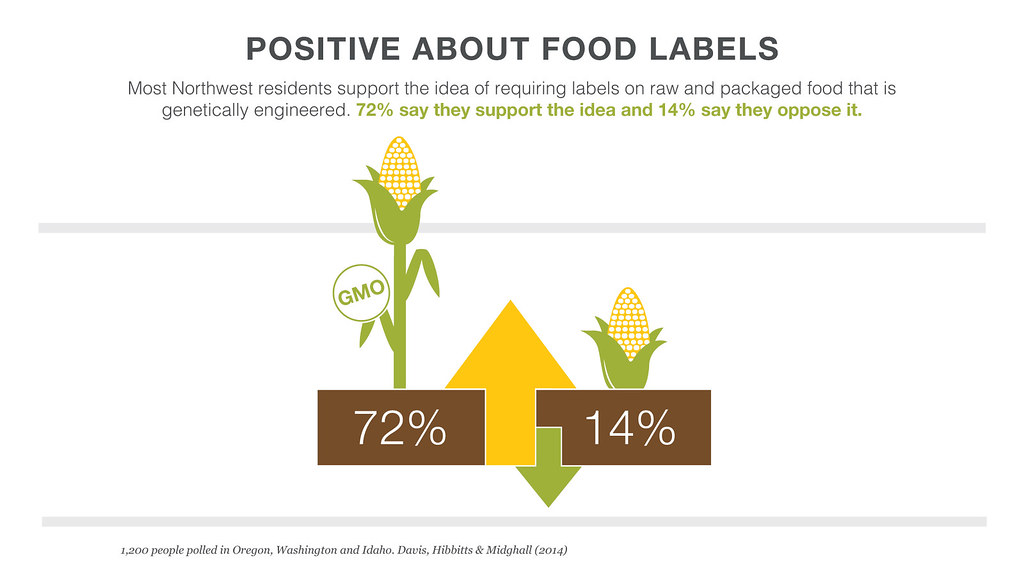
A DHM Research survey of Northwest residents was conducted in June, just as a campaign gets underway for an Oregon ballot measure requiring labeling of genetically modified food. A 2013 proposal in Washington enjoyed early support but was voted down.
Heidi Nielsen/GoodWorks
Oregon voters will likely decide in November whether the state should require the labeling of genetically engineered foods.
Early polling shows strong support. But will it end up being defeated like similar measures in California in 2012 and Washington in 2013?
A new poll for EarthFix of Oregon residents puts support for labeling genetically engineered foods at 77 percent.
DHM Research Director John Horvick said similarly overwhelming support was found in Washington and Idaho during their three-state poll. Four hundred residents per state were polled between June 25-30. The margin of error for each state's results was 4.9 percent.
The survey asked residents if they would support or oppose a ballot measure requiring labeling on raw and packaged food that is genetically engineered. It found 69-percent support among Washington residents -- contrasting the 45-percent support among voters in the November, 2013 election, when a measure to require labeling genetically modified food was defeated.
The same pattern -- strong support at the start of the campaign but voter reaction by Election Day -- played out in 2012 with California's GM food-labeling measure.
“We now have two states — Washington last year and California the year before – where they saw polling numbers like this, not that far before an election, and then saw things change quickly,” Horvick said.
Horvick said that a well-funded anti-labeling campaign largely influenced the election outcome in those two states. Some big-name national contributors included biotech firms Monsanto and Syngenta.
He added that a top donor for the pro-labeling campaign in Washington was California-based soap manufacturer, Dr. Bronner’s.
Katie Fast is vice president of public policy for the Oregon Farm Bureau. It opposed a statewide ballot measure in Oregon to label GMOs in 2002.
Fast says voters will again realize that food labeling is costly for farmers and food processors — raising grocery prices but failing to benefit consumers.
“This is 100 percent safe technology," Fast said. "You won’t be able to find a credible, peer-reviewed study that says there’s health impacts or environmental impacts.”
Fast said it gets especially tricky when out-of-state products come in to Oregon and are processed here, requiring a tracking mechanism for genetically engineered food products.
Fast said a state-by-state labeling system won’t work and a nationwide approach would be a better approach.
Sandeep Kaushik is with the Oregon Right to Know Coalition, the group responsible for gathering signatures to petition the state for a a vote on labeling genetically engineered foods. Those signatures were submitted on Wednesday. Campaigners say they're confident that more than enough were turned in to meet the requirements for their measure to reach the ballot.
Kaushik said his side has heard the farm bureau's anti-labeling talking points before – and this time they’ll keep the support of voters as the campaign plays out.
“We really think we’re going to win this race by Oregonians talking one-on-one with other Oregonians about why this issue is so important,” he said. “And having those folks counteract the false claims that are coming from the other side.”
Kaushik pointed out that 64 countries already require the labeling of genetically engineered foods, including Japan, Australia and the entire European Union.
“Food costs did not increase in those countries when labeling went into effect,” Kaushik said.

